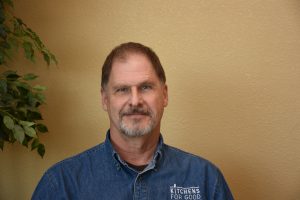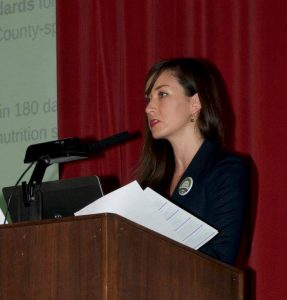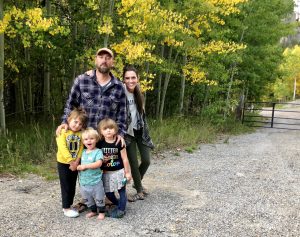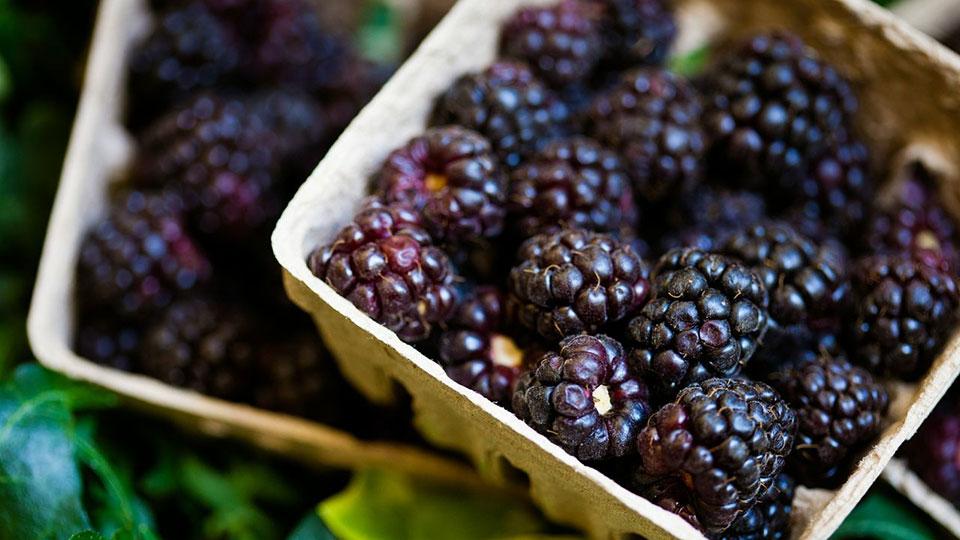Over the past seven years, the annual Berry Good Night dinner has aimed to connect and celebrate local and sustainable farmers, ranchers, fishermen, chefs, and vintners.
In September 2017 we debuted a new format (#BGN100) to increase interaction and engagement. After submitting responses to a brief questionnaire, 100 “idea ambassadors” were hand selected for their commitment toward fundamental change in our food system.
Over the course of 2018, we are profiling the participants to highlight their efforts and create greater awareness and connection within our community.
This month we focus on food waste and speak with the following advocates fighting food waste with their social enterprises.
- Chuck Samuelson, chef, restaurateur and founder of Kitchens for Good
- Elly Brown, social impact professional and Director of the San Diego Food System Alliance
- Abriana Young, a zero-waste advocate and co-founder of Closing the Loop
Chuck Samuelson, Kitchens for Good

Chuck Samuelson
Please tell us briefly about your work and your goals.
I am the founder of Kitchens for Good, a nonprofit social enterprise. We address issues of food waste, hunger, and poverty through an innovative program based on a revenue-generating social enterprise model. We use underutilized kitchens as economic engines in communities for culinary job training, food waste reduction, poverty alleviation, and to make meals for hunger relief. I spent my working life in the food service and hospitality sectors prior to leaping into the nonprofit world. My goal has always been to change the world for the better.
I grew up in Montana and started working as a dishwasher when I was 13, working my way up through the ranks to become Chef, General Manager, and eventually the owner of restaurants (Bird Rock Café in La Jolla) and a Catering Company, and spent years as a Hospitality Consultant. Working in restaurants and hotels made me aware of how much food is wasted every day. That coupled with the knowledge that many people do not have access to nutritious food led me to start Kitchens for Good as a social enterprise in 2014 with 2 employees. We now have 80+ employees and provide catering/events services and contract meals from 3 kitchens. We do 500 events a year, and our social enterprise supports 60% of our total budget. We also supply hundreds of meals a week to local hunger relief agencies at little or no cost.
Did you make any interesting connections at BGN100?
YES! I was so honored to have been invited. This was my first one and the guest list was remarkable.
Are there other ways you connect with like-minded members of the community to further your mission?
Yes, through my participation in the San Diego Food System Alliance where I serve on the Executive Committee, and my involvement with the North County Food Policy Council. And I am always having coffee with people I connect with from workshops, conferences, or that I have stalked on LinkedIn 🙂
When you’re not working, what do you enjoy doing?
Eating, eating, eating. You will find me on my days off checking out the latest new food venture, large or small around San Diego….so much food, so little time.
Do you have any favorite food waste management practices or anecdotes you’d like to share?
My freezer is my best friend. If I’ve over-shopped, and it can happen, I will freeze food until I can use it. Especially good after a bountiful day at a farmer’s market.
Elly Brown, San Diego Food System Alliance

Elly Brown
Please tell us briefly about your work and your goals.
San Diego Food System Alliance is building a “Good Food” system for our region that supports increased access to healthy, affordable food; the increased economic opportunity for local food producers; and a reduction of food waste. We work with our members in a cross-sector collaboration to share resources, strengths and knowledge for collective action to improve our food system. We are a collaborative that brings together over 120 groups including businesses, nonprofit organizations, and government entities as well as farmers, fishermen and passionate community members to improve the food environment in our region. Our goal is to bring “good food” to the 3.3 million people who live, work, play and eat in San Diego County. “Good food” to us is food that is created in a system that is sustainable, just, and local. We do this important work through building community, advocacy, and catalyzing innovation.
My job is to manage the Alliance’s operations, events, strategy, and business development. Most people that know me well in this role know that I am committed 1000% to the success of this organization and network. The Alliance is currently at a critical growth point and is welcoming an Associate Director to our team who will focus on improving our ecosystem of services for sustainable food producers in our region.
I am proud of what we have accomplished so far. We worked with cities and the state to adopt a tax incentive for urban agriculture. We received a half-million-dollar grant from a state agency to launch a regional food waste reduction and donation initiative. We just awarded refrigerators and trucks to meal-serving agencies to provide healthy food for those who are having challenges making ends meet. We’re currently developing a process to create a strong food system road map for our region and are being recognized nationally for our work on food waste.
What I am most proud of are the amazing individuals contributing to our network, including our small but mighty staff team, supportive Executive Committee members, passionate and knowledgeable Voting Members, incredibly committed Working Group leaders, and our active Working Group members. This work requires everyone to contribute to shared outcomes and we cannot do it alone. We need to continue to collaborate across all sectors and we need to continue to keep our eyes on the prize… to ensure that we preserve this planet for future generations and keep all San Diegans nourished.
Did you make any interesting connections at BGN100?
BGFF puts on great and fun events. BGN100 was very successful in bringing a like-minded community together that supports a more sustainable food system. I am always so impressed by the amazing talent that is behind the BGFF team.
Are there other ways you connect with like-minded members of the community to further your mission?
The Alliance puts on 2-3 events a year and we see familiar faces as well as new ones at these events. While connecting with like-minded individuals is important and energizing, I also feel it is important to go beyond the choir and reach other San Diegans to truly make an impact. We need to motivate and inspire beyond our network. Unfortunately, many people in San Diego don’t yet recognize the value of the abundant food resources that are available here locally. I’d love to get together with smart people within the BGFF network to have a discussion on getting strategic messaging out in the community on our local food system in a coordinated way, so we reach as many consumers as possible.
When you’re not working, what do you enjoy doing?
I try to spend any extra time I have with family and close friends. I love watching my son grow and thrive and playing well with other kids his age. I am a member of a local community garden and really enjoy being part of the gardening community, watching and learning from others that love growing. My garden has been around for over 35 years and has a life force of its own. Since my work has me out and about on a daily basis I also like to unplug and hang out in my house tidying stuff while listening to NPR or a good podcast or taking an incredibly long bath. I’m an introvert on the weekend and an extrovert at work. lol.
Do you have any favorite food waste management practices or anecdotes you’d like to share?
For food waste management, San Diego Food System Alliance is partnering with NRDC and AdCouncil on rolling out the Save The Food messaging in San Diego. We have over 100 Save The Food San Diego Champion organizations in San Diego currently (more info here). Prevention of food waste is the biggest thing we need to focus on as a society. Creating an “Eat Me First” rack in your fridge for food that’s about to spoil and weekend meal prep for the week will go a long way in terms of fighting food waste but we are encouraging positive nutrition goals as well. I love what chefs do to utilize all ingredients in their cooking. Davin and Jessica Waite of Wrench & Rodent recently gave a presentation on this and demo at our Food Waste Solution Summit 4 last week.
I really would like to encourage readers to follow us on social media @sdfoodsys! We just started a podcast series through the Specialty Produce Network. Last month we covered food insecurity issues in our community, and this month’s will be on urban agriculture. Please subscribe to our podcast on Sound Cloud. Visit sdfsa.org to find more information about our upcoming events and other ways to get engaged with our food system change work for the region.
Abriana (Bri) Young, Closing the Loop

Bri Young and family
Please tell us briefly about your work and your goals.
I own, with my husband Chris Young, Closing the Loop, an innovative waste diversion program. We exist to strengthen local agriculture communities through our innovative waste diversion programs. We are committed to our community and want to hear what people need to make sustainable living more accessible.
The current focus of my work is on environmental stewardship and awareness. This focus has been catalyzed by the zero waste work we did in San Diego county from 2012-2018, diverting over 4 million tons of food waste and beer grain from landfills. After the expansion of our diversion operation into recyclables and EWASTE, we gained a grander perspective of the scale of waste being generated worldwide. I’ve also come to understand the increasingly de-incentivized business model of recycling any waste stream. Closing the Loop is currently traveling to all fifty states to capture the political and community disconnect in waste management. The goal is to empower others to live less wasteful lives and close the loop on the political policies preventing more sound waste management and conservation efforts.
Did you make any interesting connections at BGN100?
Yes, I was seated next to Karen Archipley who I’ve been a major fan girl of since I was planning my exit from the Navy in 2014. I also met the founder of Solar Rain who was very interesting. It’s like everyone you love in the industry being in one place at the same time.
Are there other ways you connect with like-minded members of the community to further your mission?
Facebook and Instagram have been a great way for us to connect with communities all over the world. We’ve met so many people who have become clients, and people we’ve yet to meet on this tour have opened their homes to us just from following us and our work. We attend local town hall meetings, visit recycling and landfill operations nationwide and local markets to hear from politicians, processors and farmers. Connecting people to food systems and waste management practices empowers communities.
When you’re not working, what do you enjoy doing?
Playing outside with our kiddos and dogs. Mud, rain, climbing, hiking, yoga, rock collecting, stream swimming, handstands, what we like to call wild school (a variation of home school), scuba diving, scientific exploration of any type, meditation anywhere, let’s just say physical activity outside.
Do you have any favorite food waste management practices or anecdotes you’d like to share?
Travel and work in the waste management industry has taught me that if individually we incorporate consuming less into daily life, reducing the miles our products/food travel, and composting our food waste we can stop the perpetuation of wasteful consumption. The Earth is working effortlessly and waste-free absent from human consumption. When our values align with the natural cycles of the Earth we find magic all around us. We believe a focus on the waste streams in our individual lives tells a story of the internal work we need to do to realign with those natural cycles.





